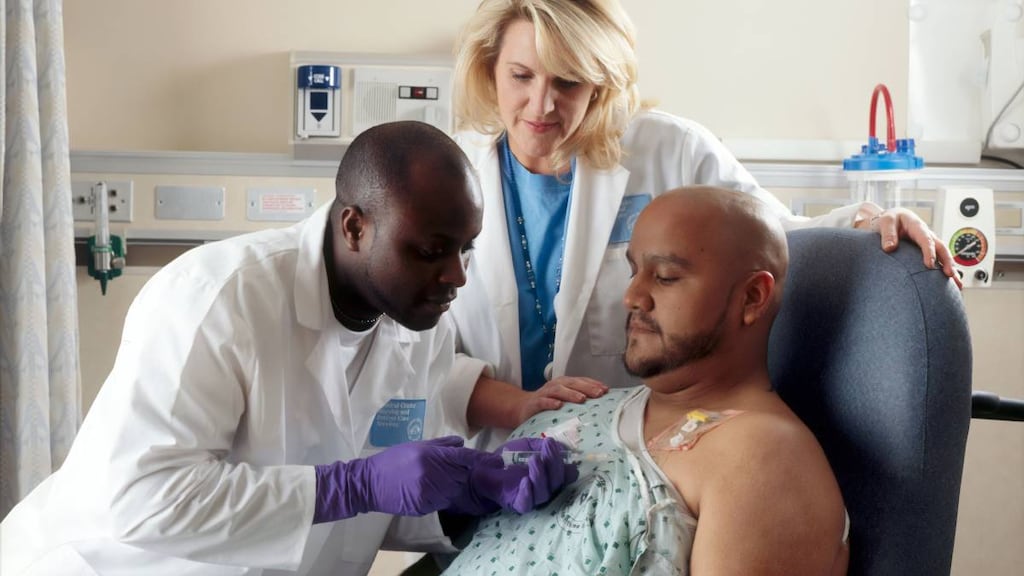What is Xofigo used for?
- Xofigo is used to treat prostate cancer.
- Xofigo may be given to you for other reasons. Talk to your doctor.
Before taking Xofigo, tell your doctor:
- If you are allergic to Xofigo; any part of this medicine; or any other drugs, foods, or substances. Tell your doctor about the allergy and what signs you had.
- If you are taking chemotherapy or other kinds of cancer treatment.
- If you have any of these health problems: Low white blood cell count, low platelet count, or low red blood cell count.
- If you are taking abiraterone with prednisone or prednisolone.
- If you are a woman. This medicine is not approved for use in women. This medicine may cause harm to an unborn baby if it is taken during pregnancy. If you are a woman using Xofigo, talk with your doctor if you are pregnant, plan on getting pregnant, or are breast-feeding.
This is not a list of all drugs or health problems that interact with this medicine.
Tell your doctor and pharmacist about all of your drugs (prescription or OTC, natural products, vitamins) and health problems. You must check to make sure that it is safe for you to take Xofigo with all of your drugs and health problems. Do not start, stop, or change the dose of any drug without checking with your doctor.
What are some things I need to know or do while I take Xofigo?
- Tell all of your health care providers that you take Xofigo. This includes your doctors, nurses, pharmacists, and dentists.
- Have blood work checked as you have been told by the doctor. Talk with the doctor.
- This medicine is radioactive. You will need to follow what the doctor has told you to lessen being exposed to Xofigo.
- Use care to keep body fluids from coming in contact with family members or caregivers. Wash soiled clothing right away and use gloves when touching body fluids for at least 1 week after each treatment.
- Use the same toilet each time you use the bathroom in your home. Sit down on the toilet to urinate to keep urine from splashing or spraying. Flush the toilet a few times after each use.
- If you have upset stomach, throwing up, diarrhea, or are not hungry, talk with your doctor. There may be ways to lower these side effects.
- This medicine may lower the ability of your bone marrow to make blood cells that your body needs. This can lead to needing a blood transfusion and very bad and sometimes deadly bleeding problems or infections. Tell your doctor right away if you have signs of infection like fever, chills, or sore throat; any bruising or bleeding; or if you feel very tired or weak.
- You may have more chance of getting an infection. Wash hands often. Stay away from people with infections, colds, or flu.
- You may bleed more easily. Be careful and avoid injury. Use a soft toothbrush and an electric razor.
- This medicine may raise the chance of bone cancer and other types of cancer. Talk with your doctor.
- This medicine may affect being able to father a child. Talk with the doctor.
- Men with a partner who may get pregnant must use birth control while taking Xofigo and for some time after the last dose. Ask your doctor how long to use birth control. If your partner gets pregnant, call the doctor right away.
How is Xofigo best taken?
Use Xofigo as ordered by your doctor. Read all information given to you. Follow all instructions closely.
- It is given as a shot into a vein.
- Drink lots of noncaffeine liquids unless told to drink less liquid by your doctor.
What are the side effects of Xofigo that I need to call my doctor about immediately?
WARNING/CAUTION: Even though it may be rare, some people may have very bad and sometimes deadly side effects when taking a drug. Tell your doctor or get medical help right away if you have any of the following signs or symptoms that may be related to a very bad side effect:
- Signs of an allergic reaction, like rash; hives; itching; red, swollen, blistered, or peeling skin with or without fever; wheezing; tightness in the chest or throat; trouble breathing, swallowing, or talking; unusual hoarseness; or swelling of the mouth, face, lips, tongue, or throat.
- Signs of infection like fever, chills, very bad sore throat, ear or sinus pain, cough, more sputum or change in color of sputum, pain with passing urine, mouth sores, or wound that will not heal.
- Signs of bleeding like throwing up or coughing up blood; vomit that looks like coffee grounds; blood in the urine; black, red, or tarry stools; bleeding from the gums; abnormal vaginal bleeding; bruises without a cause or that get bigger; or bleeding you cannot stop.
- Signs of dehydration like dry skin, mouth, or eyes; thirst; fast heartbeat; dizziness; fast breathing; or confusion.
- Signs of kidney problems like unable to pass urine, change in how much urine is passed, blood in the urine, or a big weight gain.
- Feeling very tired or weak.
- Swelling in the arms or legs.
What are some other side effects of Xofigo?
All drugs may cause side effects. However, many people have no side effects or only have minor side effects. Call your doctor or get medical help if any of these side effects or any other side effects bother you or do not go away:
- Diarrhea, upset stomach, or throwing up.
These are not all of the side effects that may occur. If you have questions about side effects, call your doctor. Call your doctor for medical advice about side effects.
You may report side effects to the FDA at 1-800-332-1088. You may also report side effects at https://www.fda.gov/medwatch.
If overdose is suspected:
If you think there has been an overdose, call your poison control center or get medical care right away. Be ready to tell or show what was taken, how much, and when it happened.
How do I store and/or throw out Xofigo?
- If you need to store Xofigo at home, talk with your doctor, nurse, or pharmacist about how to store it.
Consumer information use and disclaimer
- If your symptoms or health problems do not get better or if they become worse, call your doctor.
- Do not share your drugs with others and do not take anyone else's drugs.
- Keep all drugs in a safe place. Keep all drugs out of the reach of children and pets.
- Throw away unused or expired drugs. Do not flush down a toilet or pour down a drain unless you are told to do so. Check with your pharmacist if you have questions about the best way to throw out drugs. There may be drug take-back programs in your area.
- Some drugs may have another patient information leaflet. Check with your pharmacist. If you have any questions about Xofigo, please talk with your doctor, nurse, pharmacist, or other health care provider.
- If you think there has been an overdose, call your poison control center or get medical care right away. Be ready to tell or show what was taken, how much, and when it happened.
This information should not be used to decide whether or not to take Xofigo or any other medicine. Only the healthcare provider has the knowledge and training to decide which medicines are right for a specific patient. This information does not endorse any medicine as safe, effective, or approved for treating any patient or health condition. This is only a brief summary of general information about this medicine. It does NOT include all information about the possible uses, directions, warnings, precautions, interactions, adverse effects, or risks that may apply to Xofigo. This information is not specific medical advice and does not replace information you receive from the healthcare provider. You must talk with the healthcare provider for complete information about the risks and benefits of using this medicine.




